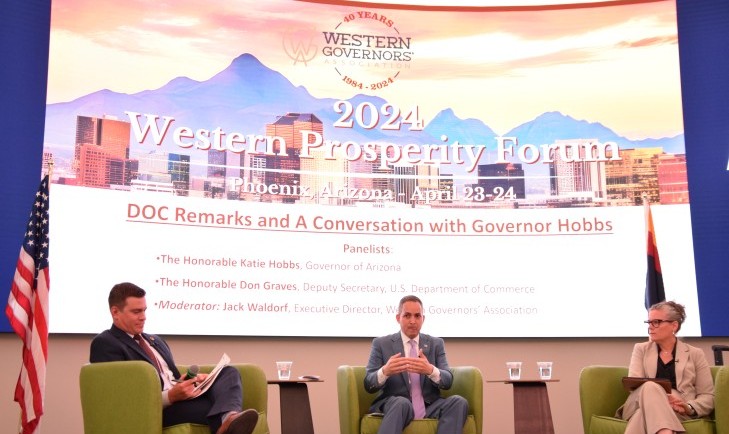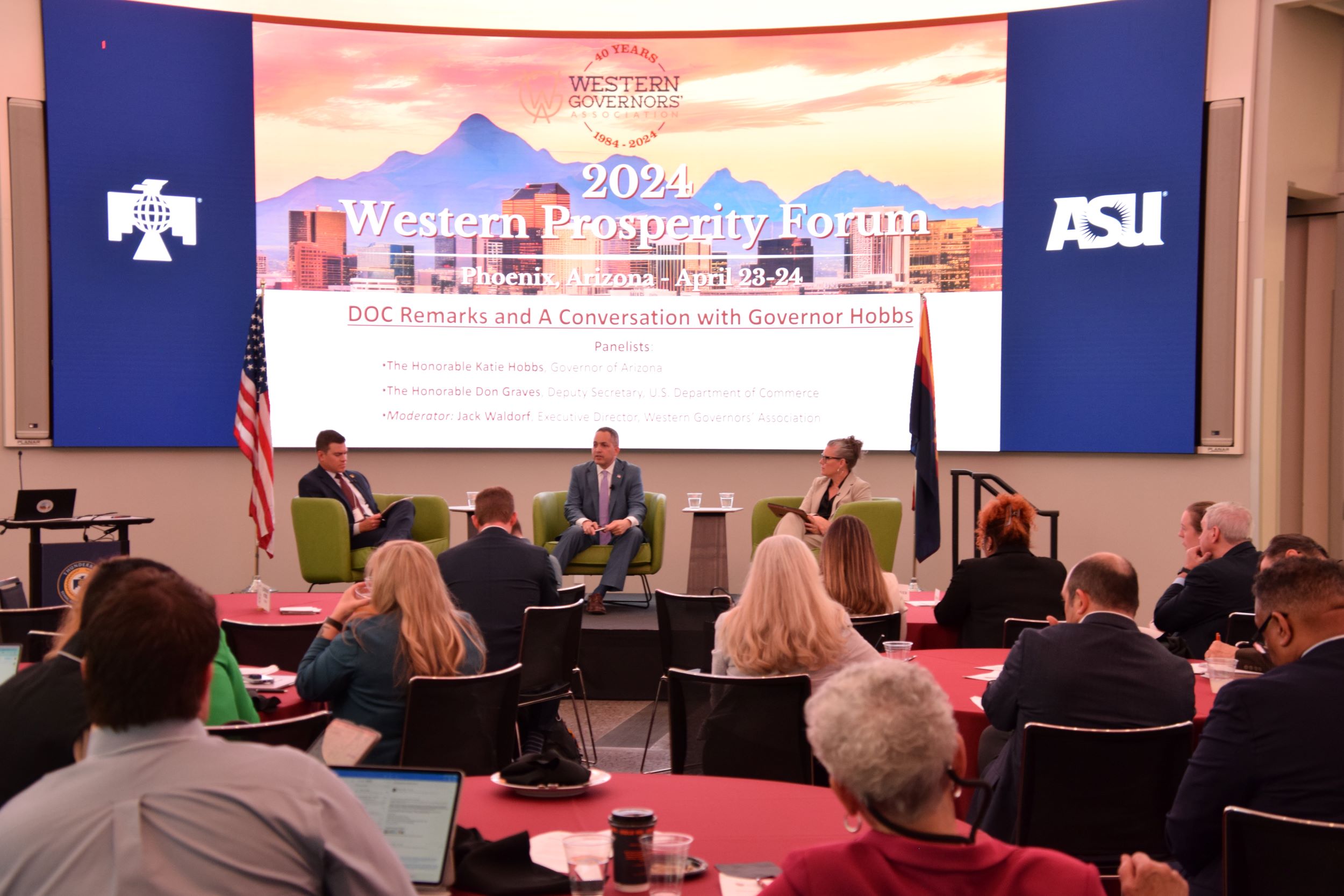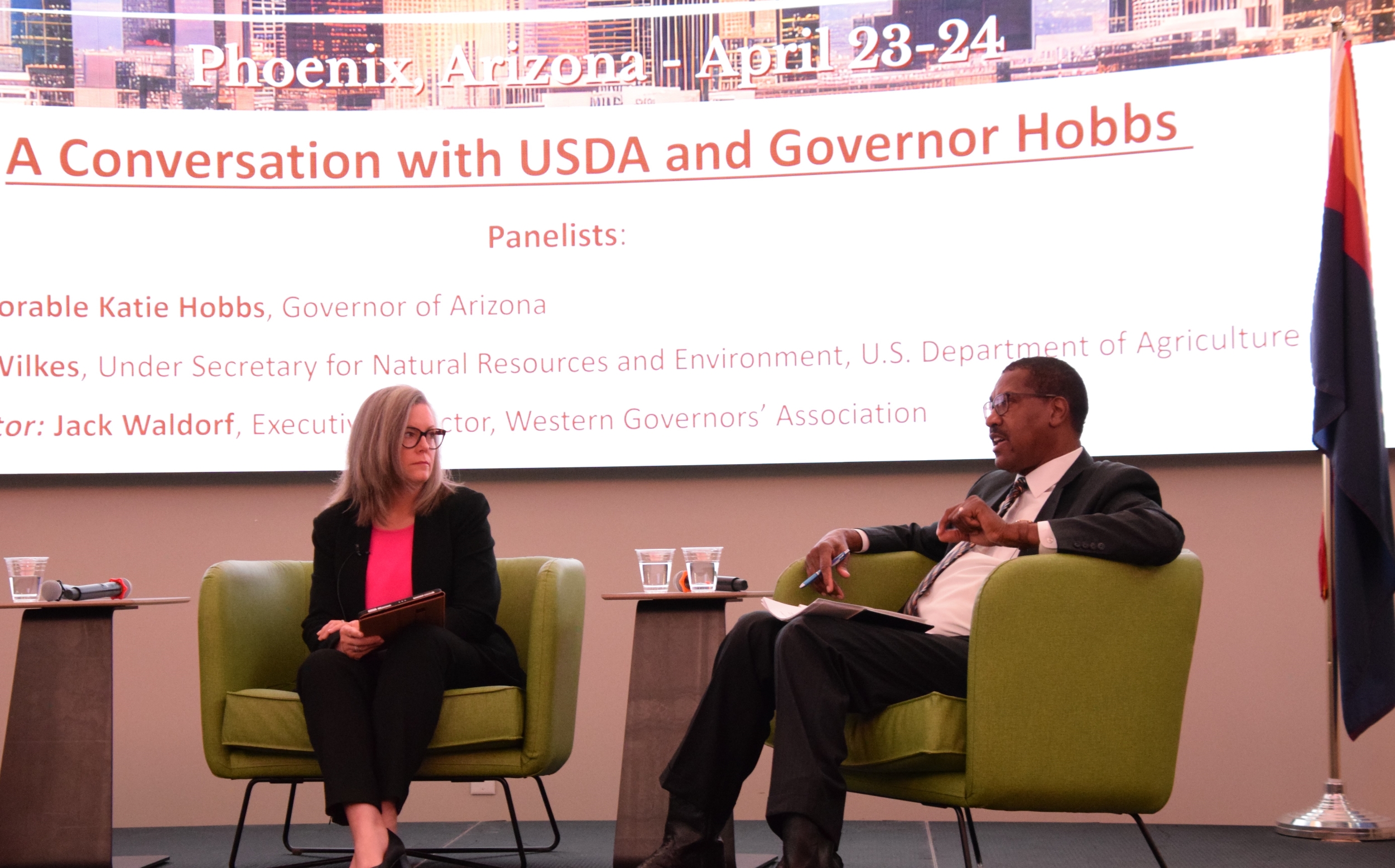
The 2024 Western Prosperity Forum was chock-full of in-depth policy discussions about everything from digital equity and workforce development to extreme heat and wildfire mitigation.
Especially noteworthy were the ‘”fireside chats” between Arizona Governor Katie Hobbs, U.S. Deputy Secretary of Commerce Don Graves, and Dr. Homer Wilkes, the Under Secretary for Natural Resources and Environment at the U.S. Department of Agriculture (USDA).
With Deputy Secretary Graves, Governor Hobbs spoke about how states can leverage investments from the federal government to drive innovation, spur growth, and support the development of a modern workforce.
 “The world is at an inflection point as we deal with the vast changes that we see going on in technology and industrial development all around the globe,” Deputy Secretary Graves said. “It's changing jobs and the direction of economies everywhere.”
“The world is at an inflection point as we deal with the vast changes that we see going on in technology and industrial development all around the globe,” Deputy Secretary Graves said. “It's changing jobs and the direction of economies everywhere.”
To take advantage of this swing, Governor Hobbs and Deputy Secretary Graves highlighted the importance of working with industry and higher education systems to modernize workforce development programs.
“Last June, I launched future 48 workforce accelerators, which are partnerships with industry and our community colleges, really scaling talent in these high-tech sectors… and most of them are in rural communities,” Governor Hobbs said. “They're connecting people in those communities with the new jobs that are coming to their communities so they can stay in their communities. That's economic development for these small rural areas.”
Thanks to these efforts, Arizona is first in the nation for new semiconductor investments. The state has also secured nine battery projects representing more than $8 billion in investments, along with several significant investments in renewable energy and advanced manufacturing.
“There is absolutely a snowball effect,” she said, “but for me, collaboration is key to everything,”
While the Governor’s discussion with Under Secretary Wilkes switched gears to focus on wildfire mitigation and forest restoration, the theme of collaboration rang true throughout.
“Wildfires don't care if they're on state, federal, or private land,” Governor Hobbs said, “so it is essential that we work in partnership to mitigate and manage the risk.”

“I'm here to tell you that partnership is very important to us at the USDA,” Under Secretary Wilkes said. “The work that needs to take place is too big for any particular entity or organization.”
To watch either of the Governor’s fireside chats, or any of the forum’s panels, click on the panel titles below.
Panel 1: Planning for Prosperous Communities
Effective planning is the foundation for building resilient and thriving western communities. During this process, leaders and community members work together to align social, economic, and environmental objectives with a shared vision. In this panel, participants will discuss how to identify community and regional needs and assets, attract industries of the future, diversify economies, and guide locally led development.
Panel 2: Fostering Digital Equity for Economic Opportunity
The jobs of today demand digital skills across a wide variety of sectors and positions, but many people still lack the ability to leverage this essential utility. As unprecedented levels of federal broadband funding are deployed, partners must work together to ensure that everyone has the skills, technology, and capacity necessary to reap the benefits of our digital economy. This panel will focus on efforts to promote digital equity and connect western residents to economic opportunities through Digital Equity Act Programs, particularly in rural and tribal areas.
DOC Remarks and a Conversation with Governor Hobbs
The Department of Commerce (DOC) works to create the conditions for economic growth and opportunity for all communities. Following opening remarks from Deputy Secretary Don Graves, Governor Hobbs will sit down for a conversation to explore how states and DOC can support the western workforce, drive industry and quality job growth, and encourage innovation in light of recent federal investments.
Panel 3: Meeting Modern Workforce Demands
Changes in the modern economy, driven by the passage of major federal legislation, including the Infrastructure Investment and Jobs Act, the CHIPS and Science Act, and the Inflation Reduction Act, will require a robust workforce across the semiconductor manufacturing industry. During this panel, participants will address how to build a lasting and supported workforce to meet current and future demands in this sector and mitigate shortages while reducing competition between states and communities.
A Conversation with USDA and Governor Hobbs
The U.S. Department of Agriculture (USDA) is a critical partner in managing the wildfire crisis through its efforts to improve forest health and reduce threats to infrastructure and communities. Governor Hobbs will sit down with Under Secretary for Natural Resources and Environment Homer Wilkes to discuss USDA’s collaboration with states on wildfire risk mitigation and forest restoration in the West.
Panel 4: Integrating Community Health and Forest Management
As poor forest health continues to drive wildfires across the West, smoke poses a growing public health threat to communities. Amid new federal action to improve coordination between agencies on wildland fire-related priorities, speakers will assess strategies to prevent uncharacteristic wildfires, alleviate community smoke exposure, and align public health and forest management objectives.
Panel 5: Addressing the Effects of Extreme Heat
Extreme heat events, which are becoming increasingly frequent and severe, have devastating socioeconomic consequences. In addition to being a significant cause of mortality, extreme heat can result in widespread economic losses, dangerous working conditions, and poor health and wellbeing. This panel will examine the implications of extreme heat across the West and state and federal efforts to develop standards and programs to confront this issue and assist communities in planning for a new reality.
Remarks from The Honorable Stephen Roe Lewis, Governor of the Gila River Indian Community
Panel 6: Emerging Energy Opportunities for Rural Communities
Federal incentives and a shift towards diversified and distributed energy production present exciting possibilities for rural communities. In addition to cost-saving and revenue generating benefits, these investments can spur regional energy solutions and improve rural energy systems' resilience. For this session, panelists will analyze the tools available for farms, ranches, and rural businesses to capitalize on emerging energy opportunities.